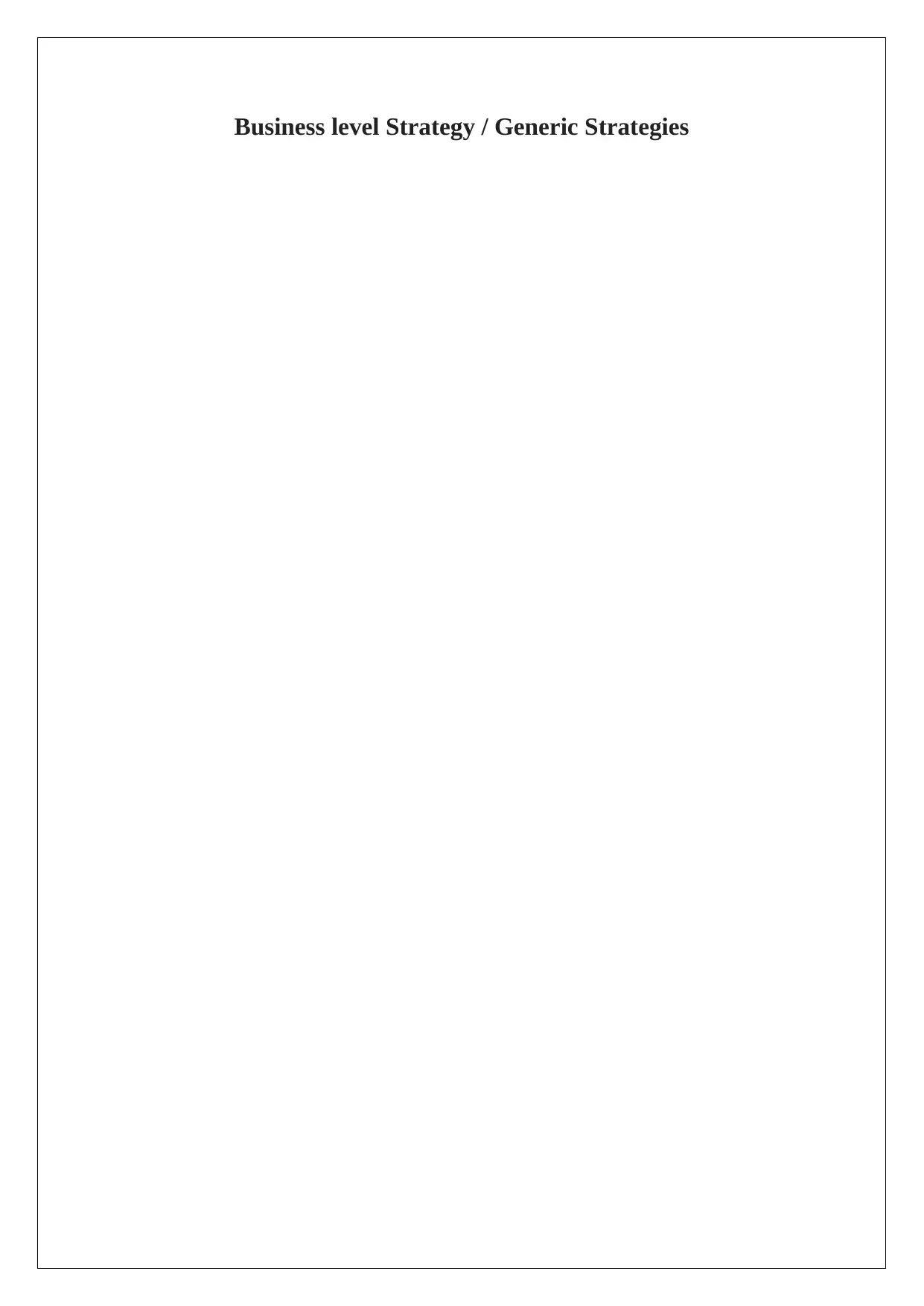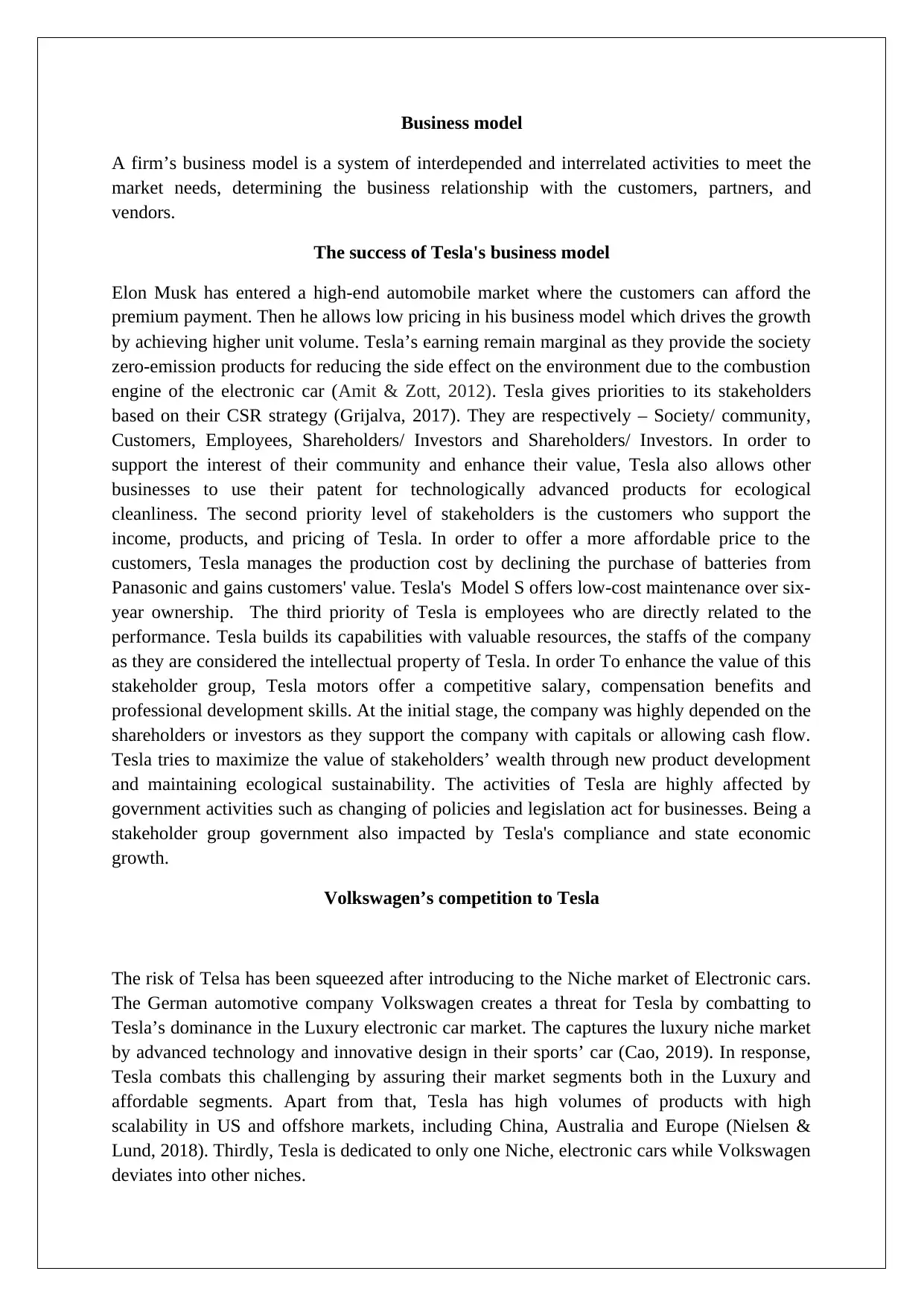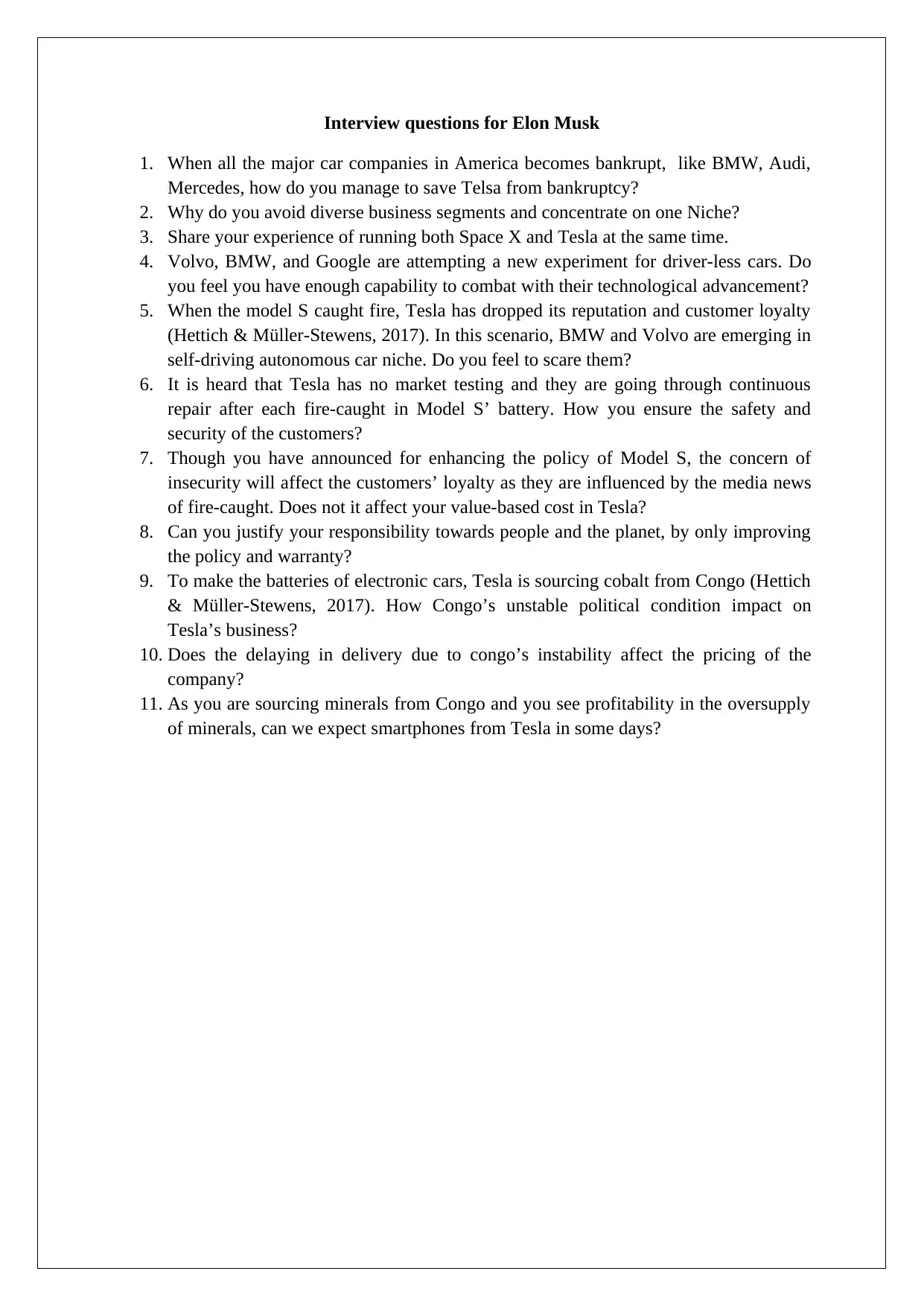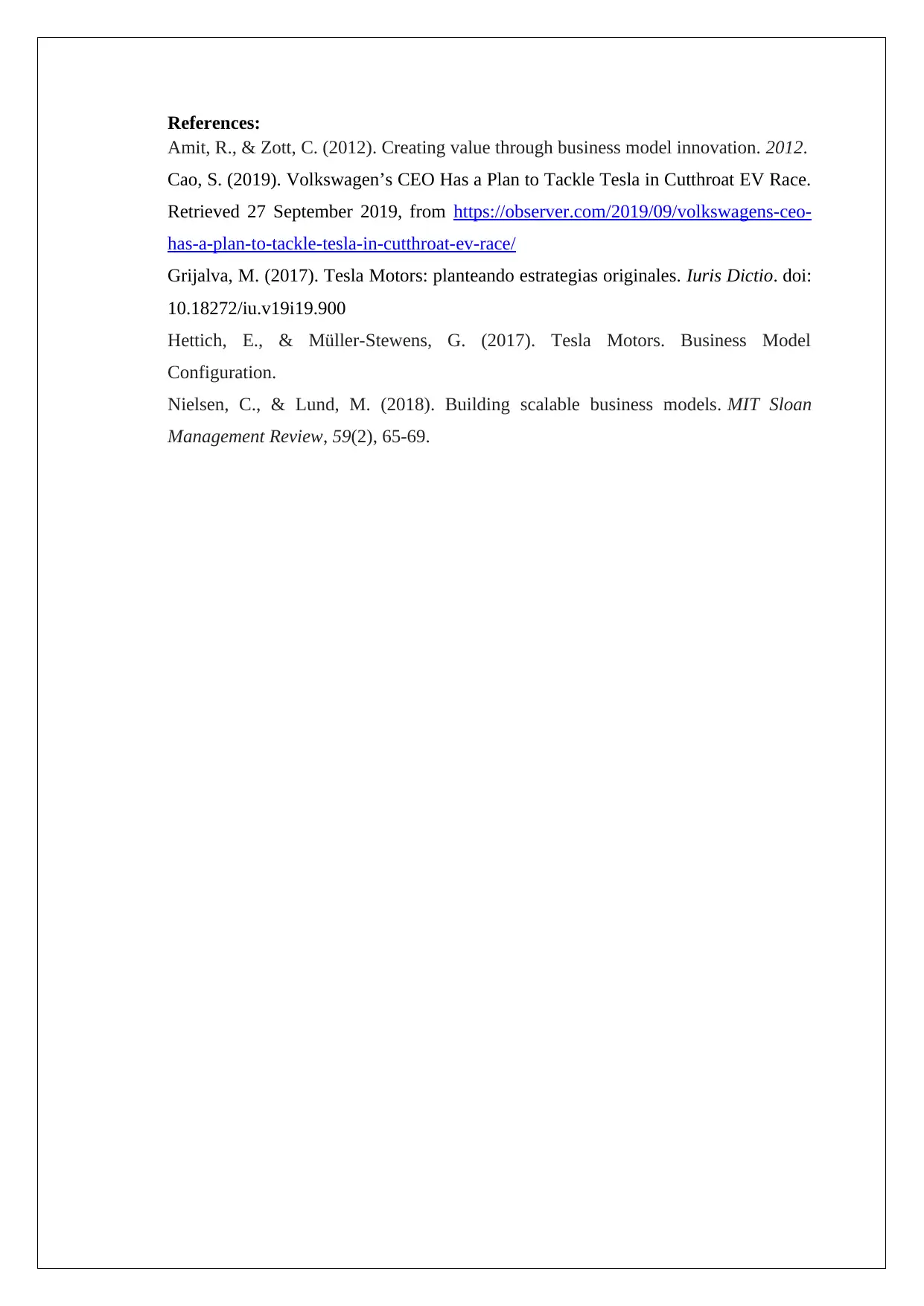Tesla's Business Model, Competitive Landscape, and Strategic Analysis
VerifiedAdded on 2022/10/09
|4
|974
|13
Case Study
AI Summary
This case study examines Tesla's business model, focusing on its generic strategies and stakeholder priorities. It analyzes Tesla's approach to the high-end automobile market, its emphasis on zero-emission products, and its stakeholder management, including society, customers, employees, and investors. The study also explores Tesla's competitive landscape, particularly the challenges posed by Volkswagen in the luxury electric car market. Furthermore, it includes potential interview questions for Elon Musk, addressing topics such as bankruptcy management, business segment focus, competition with other companies, safety concerns, and ethical considerations related to sourcing materials. The case study utilizes references to support its analysis of Tesla's strategies and the broader business environment.

Business level Strategy / Generic Strategies
Paraphrase This Document
Need a fresh take? Get an instant paraphrase of this document with our AI Paraphraser

Business model
A firm’s business model is a system of interdepended and interrelated activities to meet the
market needs, determining the business relationship with the customers, partners, and
vendors.
The success of Tesla's business model
Elon Musk has entered a high-end automobile market where the customers can afford the
premium payment. Then he allows low pricing in his business model which drives the growth
by achieving higher unit volume. Tesla’s earning remain marginal as they provide the society
zero-emission products for reducing the side effect on the environment due to the combustion
engine of the electronic car (Amit & Zott, 2012). Tesla gives priorities to its stakeholders
based on their CSR strategy (Grijalva, 2017). They are respectively – Society/ community,
Customers, Employees, Shareholders/ Investors and Shareholders/ Investors. In order to
support the interest of their community and enhance their value, Tesla also allows other
businesses to use their patent for technologically advanced products for ecological
cleanliness. The second priority level of stakeholders is the customers who support the
income, products, and pricing of Tesla. In order to offer a more affordable price to the
customers, Tesla manages the production cost by declining the purchase of batteries from
Panasonic and gains customers' value. Tesla's Model S offers low-cost maintenance over six-
year ownership. The third priority of Tesla is employees who are directly related to the
performance. Tesla builds its capabilities with valuable resources, the staffs of the company
as they are considered the intellectual property of Tesla. In order To enhance the value of this
stakeholder group, Tesla motors offer a competitive salary, compensation benefits and
professional development skills. At the initial stage, the company was highly depended on the
shareholders or investors as they support the company with capitals or allowing cash flow.
Tesla tries to maximize the value of stakeholders’ wealth through new product development
and maintaining ecological sustainability. The activities of Tesla are highly affected by
government activities such as changing of policies and legislation act for businesses. Being a
stakeholder group government also impacted by Tesla's compliance and state economic
growth.
Volkswagen’s competition to Tesla
The risk of Telsa has been squeezed after introducing to the Niche market of Electronic cars.
The German automotive company Volkswagen creates a threat for Tesla by combatting to
Tesla’s dominance in the Luxury electronic car market. The captures the luxury niche market
by advanced technology and innovative design in their sports’ car (Cao, 2019). In response,
Tesla combats this challenging by assuring their market segments both in the Luxury and
affordable segments. Apart from that, Tesla has high volumes of products with high
scalability in US and offshore markets, including China, Australia and Europe (Nielsen &
Lund, 2018). Thirdly, Tesla is dedicated to only one Niche, electronic cars while Volkswagen
deviates into other niches.
A firm’s business model is a system of interdepended and interrelated activities to meet the
market needs, determining the business relationship with the customers, partners, and
vendors.
The success of Tesla's business model
Elon Musk has entered a high-end automobile market where the customers can afford the
premium payment. Then he allows low pricing in his business model which drives the growth
by achieving higher unit volume. Tesla’s earning remain marginal as they provide the society
zero-emission products for reducing the side effect on the environment due to the combustion
engine of the electronic car (Amit & Zott, 2012). Tesla gives priorities to its stakeholders
based on their CSR strategy (Grijalva, 2017). They are respectively – Society/ community,
Customers, Employees, Shareholders/ Investors and Shareholders/ Investors. In order to
support the interest of their community and enhance their value, Tesla also allows other
businesses to use their patent for technologically advanced products for ecological
cleanliness. The second priority level of stakeholders is the customers who support the
income, products, and pricing of Tesla. In order to offer a more affordable price to the
customers, Tesla manages the production cost by declining the purchase of batteries from
Panasonic and gains customers' value. Tesla's Model S offers low-cost maintenance over six-
year ownership. The third priority of Tesla is employees who are directly related to the
performance. Tesla builds its capabilities with valuable resources, the staffs of the company
as they are considered the intellectual property of Tesla. In order To enhance the value of this
stakeholder group, Tesla motors offer a competitive salary, compensation benefits and
professional development skills. At the initial stage, the company was highly depended on the
shareholders or investors as they support the company with capitals or allowing cash flow.
Tesla tries to maximize the value of stakeholders’ wealth through new product development
and maintaining ecological sustainability. The activities of Tesla are highly affected by
government activities such as changing of policies and legislation act for businesses. Being a
stakeholder group government also impacted by Tesla's compliance and state economic
growth.
Volkswagen’s competition to Tesla
The risk of Telsa has been squeezed after introducing to the Niche market of Electronic cars.
The German automotive company Volkswagen creates a threat for Tesla by combatting to
Tesla’s dominance in the Luxury electronic car market. The captures the luxury niche market
by advanced technology and innovative design in their sports’ car (Cao, 2019). In response,
Tesla combats this challenging by assuring their market segments both in the Luxury and
affordable segments. Apart from that, Tesla has high volumes of products with high
scalability in US and offshore markets, including China, Australia and Europe (Nielsen &
Lund, 2018). Thirdly, Tesla is dedicated to only one Niche, electronic cars while Volkswagen
deviates into other niches.

Interview questions for Elon Musk
1. When all the major car companies in America becomes bankrupt, like BMW, Audi,
Mercedes, how do you manage to save Telsa from bankruptcy?
2. Why do you avoid diverse business segments and concentrate on one Niche?
3. Share your experience of running both Space X and Tesla at the same time.
4. Volvo, BMW, and Google are attempting a new experiment for driver-less cars. Do
you feel you have enough capability to combat with their technological advancement?
5. When the model S caught fire, Tesla has dropped its reputation and customer loyalty
(Hettich & Müller-Stewens, 2017). In this scenario, BMW and Volvo are emerging in
self-driving autonomous car niche. Do you feel to scare them?
6. It is heard that Tesla has no market testing and they are going through continuous
repair after each fire-caught in Model S’ battery. How you ensure the safety and
security of the customers?
7. Though you have announced for enhancing the policy of Model S, the concern of
insecurity will affect the customers’ loyalty as they are influenced by the media news
of fire-caught. Does not it affect your value-based cost in Tesla?
8. Can you justify your responsibility towards people and the planet, by only improving
the policy and warranty?
9. To make the batteries of electronic cars, Tesla is sourcing cobalt from Congo (Hettich
& Müller-Stewens, 2017). How Congo’s unstable political condition impact on
Tesla’s business?
10. Does the delaying in delivery due to congo’s instability affect the pricing of the
company?
11. As you are sourcing minerals from Congo and you see profitability in the oversupply
of minerals, can we expect smartphones from Tesla in some days?
1. When all the major car companies in America becomes bankrupt, like BMW, Audi,
Mercedes, how do you manage to save Telsa from bankruptcy?
2. Why do you avoid diverse business segments and concentrate on one Niche?
3. Share your experience of running both Space X and Tesla at the same time.
4. Volvo, BMW, and Google are attempting a new experiment for driver-less cars. Do
you feel you have enough capability to combat with their technological advancement?
5. When the model S caught fire, Tesla has dropped its reputation and customer loyalty
(Hettich & Müller-Stewens, 2017). In this scenario, BMW and Volvo are emerging in
self-driving autonomous car niche. Do you feel to scare them?
6. It is heard that Tesla has no market testing and they are going through continuous
repair after each fire-caught in Model S’ battery. How you ensure the safety and
security of the customers?
7. Though you have announced for enhancing the policy of Model S, the concern of
insecurity will affect the customers’ loyalty as they are influenced by the media news
of fire-caught. Does not it affect your value-based cost in Tesla?
8. Can you justify your responsibility towards people and the planet, by only improving
the policy and warranty?
9. To make the batteries of electronic cars, Tesla is sourcing cobalt from Congo (Hettich
& Müller-Stewens, 2017). How Congo’s unstable political condition impact on
Tesla’s business?
10. Does the delaying in delivery due to congo’s instability affect the pricing of the
company?
11. As you are sourcing minerals from Congo and you see profitability in the oversupply
of minerals, can we expect smartphones from Tesla in some days?
⊘ This is a preview!⊘
Do you want full access?
Subscribe today to unlock all pages.

Trusted by 1+ million students worldwide

References:
Amit, R., & Zott, C. (2012). Creating value through business model innovation. 2012.
Cao, S. (2019). Volkswagen’s CEO Has a Plan to Tackle Tesla in Cutthroat EV Race.
Retrieved 27 September 2019, from https://observer.com/2019/09/volkswagens-ceo-
has-a-plan-to-tackle-tesla-in-cutthroat-ev-race/
Grijalva, M. (2017). Tesla Motors: planteando estrategias originales. Iuris Dictio. doi:
10.18272/iu.v19i19.900
Hettich, E., & Müller-Stewens, G. (2017). Tesla Motors. Business Model
Configuration.
Nielsen, C., & Lund, M. (2018). Building scalable business models. MIT Sloan
Management Review, 59(2), 65-69.
Amit, R., & Zott, C. (2012). Creating value through business model innovation. 2012.
Cao, S. (2019). Volkswagen’s CEO Has a Plan to Tackle Tesla in Cutthroat EV Race.
Retrieved 27 September 2019, from https://observer.com/2019/09/volkswagens-ceo-
has-a-plan-to-tackle-tesla-in-cutthroat-ev-race/
Grijalva, M. (2017). Tesla Motors: planteando estrategias originales. Iuris Dictio. doi:
10.18272/iu.v19i19.900
Hettich, E., & Müller-Stewens, G. (2017). Tesla Motors. Business Model
Configuration.
Nielsen, C., & Lund, M. (2018). Building scalable business models. MIT Sloan
Management Review, 59(2), 65-69.
1 out of 4
Related Documents
Your All-in-One AI-Powered Toolkit for Academic Success.
+13062052269
info@desklib.com
Available 24*7 on WhatsApp / Email
![[object Object]](/_next/static/media/star-bottom.7253800d.svg)
Unlock your academic potential
Copyright © 2020–2026 A2Z Services. All Rights Reserved. Developed and managed by ZUCOL.





